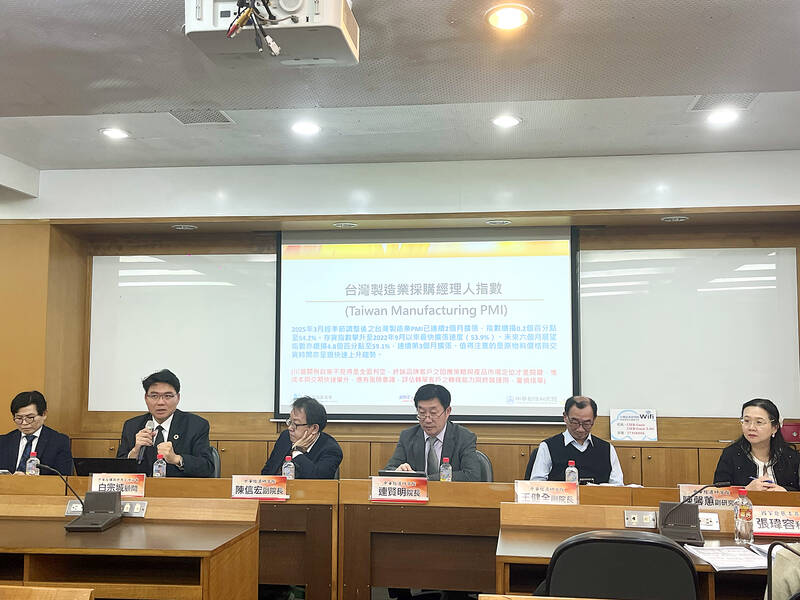Taiwan’s official purchasing managers’ index (PMI) last month rose 0.2 percentage points to 54.2, in a second consecutive month of expansion, thanks to front-loading demand intended to avoid potential US tariff hikes, the Chung-Hua Institution for Economic Research (CIER, 中華經濟研究院) said yesterday.
While short-term demand appeared robust, uncertainties rose due to US President Donald Trump’s unpredictable trade policy, CIER president Lien Hsien-ming (連賢明) told a news conference in Taipei.
Taiwan’s economy this year would be characterized by high-level fluctuations and the volatility would be wilder than most expect, Lien said

Photo: Hsu Tzu-ling, Taipei Times
Demand for electronics, particularly semiconductors, continues to benefit from US technology giants’ effort to develop artificial intelligence applications, but Trump’s unpredictable policy stance casts a shadow over global trade, he said.
PMI data aim to assess the health of the manufacturing industry, with values of more than 50 suggesting expansion and points below the threshold suggesting contraction.
Trump is today expected to introduce reciprocal tariffs, leading businesses around the world to adopt a wait-and-see attitude, Lien said.
The reading on new orders rose 2.4 percentage points to 56.8, the fastest growth since July last year, but short orders accounted for a large chunk and many firms indicated they do not see orders beyond this month, the Taipei-based institute said.
The latest PMI data showed that the inventory subindex gathered 1.2 percentage points to 53.9, the strongest expansion since September 2022, as manufacturers engaged in more active restocking following inventory adjustments in 2023, CIER said.
Local makers also showed more confidence about their business prospects, as the six-month outlook gained 4.8 percentage points to 59.1, the institute said.
CIER researcher Chen Shin-hui (陳馨蕙), who is in charge of the PMI survey, said not all firms hold negative views of US tariffs.
Some Taiwanese firms have benefited from order transfers after Chinese suppliers came under trade restrictions, she said.
However, Academia Sinica fellow Kamhon Kan (簡錦漢) issued a cautionary note, saying that things might take a different turn next month, as Trump could threaten more tariffs, creating more uncertainty about investment destinations, in addition to Mexico and Canada.
Vietnam, a popular investment destination among Taiwanese firms, also ranks high in terms of trade surpluses with the US, Kan said.
“Whatever advantages a destination has today might be gone tomorrow,” he said.
Taiwan’s nonmanufacturing index rose 4.6 percentage points to 53.8, ending a mild contraction in February, the CIER said.
However, service providers have a conservative outlook about business over the next six months, it said.

Sweeping policy changes under US Secretary of Health and Human Services Robert F. Kennedy Jr are having a chilling effect on vaccine makers as anti-vaccine rhetoric has turned into concrete changes in inoculation schedules and recommendations, investors and executives said. The administration of US President Donald Trump has in the past year upended vaccine recommendations, with the country last month ending its longstanding guidance that all children receive inoculations against flu, hepatitis A and other diseases. The unprecedented changes have led to diminished vaccine usage, hurt the investment case for some biotechs, and created a drag that would likely dent revenues and

Global semiconductor stocks advanced yesterday, as comments by Nvidia Corp chief executive officer Jensen Huang (黃仁勳) at Davos, Switzerland, helped reinforce investor enthusiasm for artificial intelligence (AI). Samsung Electronics Co gained as much as 5 percent to an all-time high, helping drive South Korea’s benchmark KOSPI above 5,000 for the first time. That came after the Philadelphia Semiconductor Index rose more than 3 percent to a fresh record on Wednesday, with a boost from Nvidia. The gains came amid broad risk-on trade after US President Donald Trump withdrew his threat of tariffs on some European nations over backing for Greenland. Huang further

CULPRITS: Factors that affected the slip included falling global crude oil prices, wait-and-see consumer attitudes due to US tariffs and a different Lunar New Year holiday schedule Taiwan’s retail sales ended a nine-year growth streak last year, slipping 0.2 percent from a year earlier as uncertainty over US tariff policies affected demand for durable goods, data released on Friday by the Ministry of Economic Affairs showed. Last year’s retail sales totaled NT$4.84 trillion (US$153.27 billion), down about NT$9.5 billion, or 0.2 percent, from 2024. Despite the decline, the figure was still the second-highest annual sales total on record. Ministry statistics department deputy head Chen Yu-fang (陳玉芳) said sales of cars, motorcycles and related products, which accounted for 17.4 percent of total retail rales last year, fell NT$68.1 billion, or

HSBC Bank Taiwan Ltd (匯豐台灣商銀) and the Taiwan High Prosecutors Office recently signed a memorandum of understanding (MOU) to enhance cooperation on the suspicious transaction analysis mechanism. This landmark agreement makes HSBC the first foreign bank in Taiwan to establish such a partnership with the High Prosecutors Office, underscoring its commitment to active anti-fraud initiatives, financial inclusion, and the “Treating Customers Fairly” principle. Through this deep public-private collaboration, both parties aim to co-create a secure financial ecosystem via early warning detection and precise fraud prevention technologies. At the signing ceremony, HSBC Taiwan CEO and head of banking Adam Chen (陳志堅)